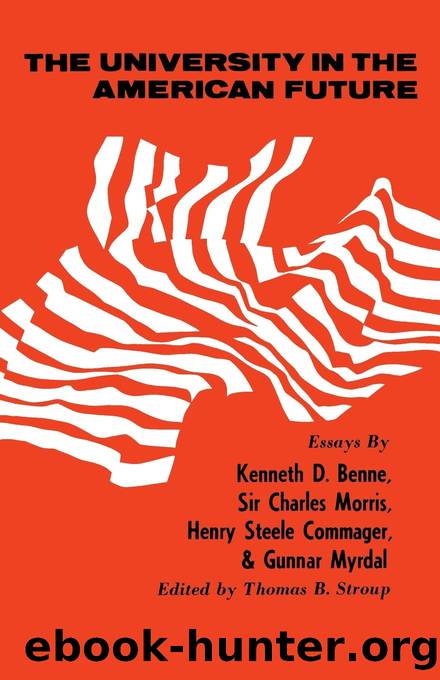The University in the American Future by Stroup Thomas B.;

Author:Stroup, Thomas B.; [Stroup, Thomas B.]
Language: eng
Format: epub
Publisher: University Press of Kentucky
Published: 2021-08-15T00:00:00+00:00
THE UNIVERSITY AND
THE COMMUNITY OF LEARNING
By HENRY STEELE COMMAGER
WHEN WE CONSIDER the nature and the role of the university at the beginning of the next century, the history of predictions admonishes us to be both cautious and modest, for few of them are vindicated by history. âAnd the things men looked for cometh not / And a path there was, where no man thoughtâ seems to be the rule in history. How sobering to contemplate the utopias of the past, from Platoâs Republic to Baconâs New Atlantis, and Butlerâs Erewhon; how different the New World from the New Atlantis, how different Australia from Erewhon, how different even the real Israel from Theodor Herzlâs Altneuland and from the plans of the Zionists. How misguided, for that matter, the prophecies of our own founding fathers of the development of the American society. And the difficulty, on the whole, has not been that the predictions were too visionary, but that they were too prosaic, not that they have been too voluptuous, but that they have been too unimaginative. It is well, when looking to the future, to recall Daniel Burnhamâs admonition: âMake no little plans.â
It is a mere thirty-five years now to the year 2000, a single generation, as generations go. Who, in 1930 looking ahead to 1965, imagined, or could have imagined the development of the university and its associated institutions over this thirty-five year period? Who, then, would have imagined that this generation from the thirties to the sixties would prove the most progressive and creative in the history of higher education? Abraham Flexner had just published his mordant Universities: American, English, German contrasting American universities unfavorably with the German, and educators who imagined that the American university might be something new under the academic sun were being put in their place by Robert Hutchins. Almost everywhere the college was the tail that wagged the academic dog. (Kentucky, for example, authorized the Ph.D. in history only in 1931.) And in a good many other places the football team was the most important thing about the college. Most colleges and universities were worried about filling their class rooms and dormitories, and about paying their professors: the state of Kentucky, for example, reduced its biennial appropriation from something over three to less than two million dollars in a period of four years. Notwithstanding the threat of impoverishment, few educators called for federal aid, and those who did were looked upon as the enemies of both learning and freedom, for it was an article of faith that federal aid spelled federal control. And certainly it never occurred to anyone in that innocent day, that either the universities or the government had any responsibility for education among the backward peoples of the world.
What has happened in the past generation suggests discretion in prediction. But it suggests, too, the direction which higher education in America (and perhaps in Europe) will in all likelihood take in the next generation. The quantitative changes are obvious. There has been
Download
This site does not store any files on its server. We only index and link to content provided by other sites. Please contact the content providers to delete copyright contents if any and email us, we'll remove relevant links or contents immediately.
The Art of Coaching Workbook by Elena Aguilar(50168)
Trainspotting by Irvine Welsh(21078)
Twilight of the Idols With the Antichrist and Ecce Homo by Friedrich Nietzsche(18324)
Fangirl by Rainbow Rowell(8819)
Periodization Training for Sports by Tudor Bompa(7947)
Change Your Questions, Change Your Life by Marilee Adams(7405)
This Is How You Lose Her by Junot Diaz(6477)
Asking the Right Questions: A Guide to Critical Thinking by M. Neil Browne & Stuart M. Keeley(5389)
Grit by Angela Duckworth(5322)
Red Sparrow by Jason Matthews(5230)
Paper Towns by Green John(4826)
Room 212 by Kate Stewart(4768)
Ken Follett - World without end by Ken Follett(4468)
The Sports Rules Book by Human Kinetics(4099)
Housekeeping by Marilynne Robinson(4085)
Double Down (Diary of a Wimpy Kid Book 11) by Jeff Kinney(3960)
Papillon (English) by Henri Charrière(3942)
The Motorcycle Diaries by Ernesto Che Guevara(3804)
Exercise Technique Manual for Resistance Training by National Strength & Conditioning Association(3800)
